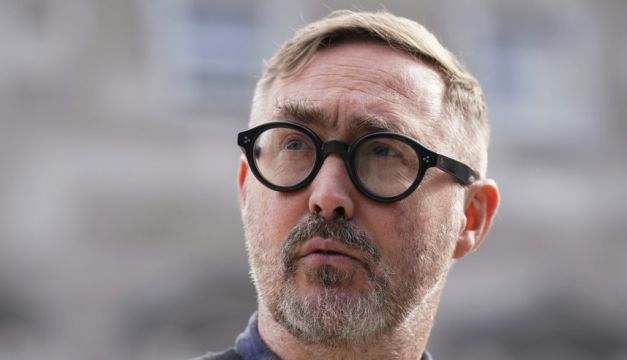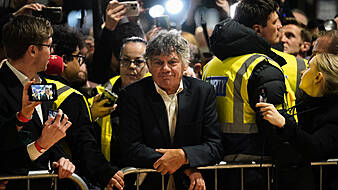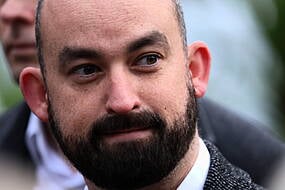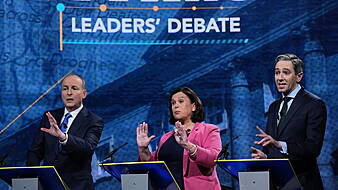A Sinn Féin TD has said there is now a stronger bloc of parties on the left in the Dáil and it made sense to talk to each other about forming a government.
Three long days of counting in the general election finished late on Monday night when the final two seats were declared in the constituency of Cavan-Monaghan.
Fianna Fáil was the clear winner of the election, securing 48 of the Dáil’s 174 seats. Sinn Féin took 39 and Fine Gael 38. Labour and the Social Democrats both won 11 seats; People Before Profit-Solidarity took three; Aontú secured two; and the Green Party retained only one of its 12 seats. Independents and others accounted for 21 seats.
Eoin Ó Broin, Sinn Féin's housing spokesperson, said a week was a long time in politics and many things could change, despite Fianna Fáil and Fine Gael having the seats to form a government.
“The numbers are very clear. Fianna Fáil and Fine Gael do have the numbers to form a government, albeit with some external support. However, a deal hasn't been reached,” he told RTÉ radio’s Morning Ireland.
“So given the fact that our view is that a Fianna Fáil and Fine Gael coalition is the worst possible option, despite the fact that Micheál Martin seems intent on bringing Fine Gael in as a junior partner.
“We said we were going to talk to other like minded progressive political parties on the other side of the election. That's exactly what we're going to do. And in the first instance, it's to assess what are the options, What are the possibilities? Micheál Martin clearly has the upper hand, there’s no denying that.”
“The conversations that we're hoping to have with the Social Democrats, with the Labor Party and then with the other progressive groupings are about, look, where are we? What are the possibilities here? What are the areas of cooperation? But also everybody's in opposition.”
Mr Ó Broin said “everybody seems to have accepted” that Fianna Fáil and Fine Gael have done a deal.
“They haven’t done a deal. And unlike 2020, Fianna Fáil has the upper hand. They have 10 more seats and I think there's going to be some real challenges to Fine Gael, do they really want to be the junior partner. Do they want to have less time as Taoiseach if they get a rotating Taoiseach? Do they want to have less ministries?”
Sinn Féin was going to talk to “like-minded parties”, but they also had to meet as a parliamentary party and listen to their new TDs. They would be moving forward “step by step. I think that's the sensible thing for us to do.”
The party had said throughout the campaign that their first preference was a government without Fianna Fáil or Fine Gael, but that if those numbers were not available then they would talk to everybody, he added.
“And that includes Fianna Fáil. And if you look at what's happened on the left side of the political spectrum, Sinn Féin has consolidated, increased our seats, the Social Democrats and Labour have increased their seats. That's a powerful bloc of 16 progressive politicians for Opposition who campaigned and advocated for change. So again, we're not losing the run of ourselves. All we want to do in the first instance is talk to the other parties and see what options are available. And again, there's a possibility that Fianna Fáil and Fine Gael won't reach a deal.”
Mr Ó Broin said that the briefings from Fianna Fáil and Fine Gael indicated that they did not think there would be a government until February “despite all the challenges that the country has. So we're going to take this step by step and we're going to do exactly what we said we would do during the election.
“It is important to acknowledge that something has shifted. There is now a far larger and more cohesive, progressive left Republican bloc between Sinn Fein, Labour and the Soc Dems. Yes, there's People Before Profit and left independents, although a smaller number. So I think the smart thing to do is for us to be talking to each other to see how we can best utilise that strength, whether it's in government, whether it's in opposition. We're not going to know how that plays out for a while.”
Mr Ó Broin acknowledged that it had been “a very, very difficult number of months” for Sinn Féin, but the party turned that around, he said.
“We have consolidated our position as one of the three large parties. We won back seats that we had lost because of defections, and we also gained seats with ten new TDs joining the Dáil.

“We returned more TDs with the second largest party. We've consolidated our position. We're going to have to sit down and do a very detailed constituency by constituency analysis to work out where those votes went. Some of them stay at home. Did some of them go to other parties? Why was that? But anyway, three months ago, two months ago, people were asking how many seats were we going to lose?
“I think in fairness to both Mary Lou McDonald as the party leader and the party's campaign teams on the ground, not just the candidates, but also the directors of election campaign team in a very short space of time. We turned that around to have what I think is a decent result.
“Any election where you win more seats and when you consolidate your position, particularly given the difficult year we've had, there are lots of positives. Is it perfect? By no means. Nor would I describe it as a bad election.”
Mr Ó Broin also defended party leader Mary Lou McDonald who he said had a very strong campaign. She was one of the reasons why the party had been able “to turn the ship around” and consolidated their vote and came back with 10 new TDs.”







